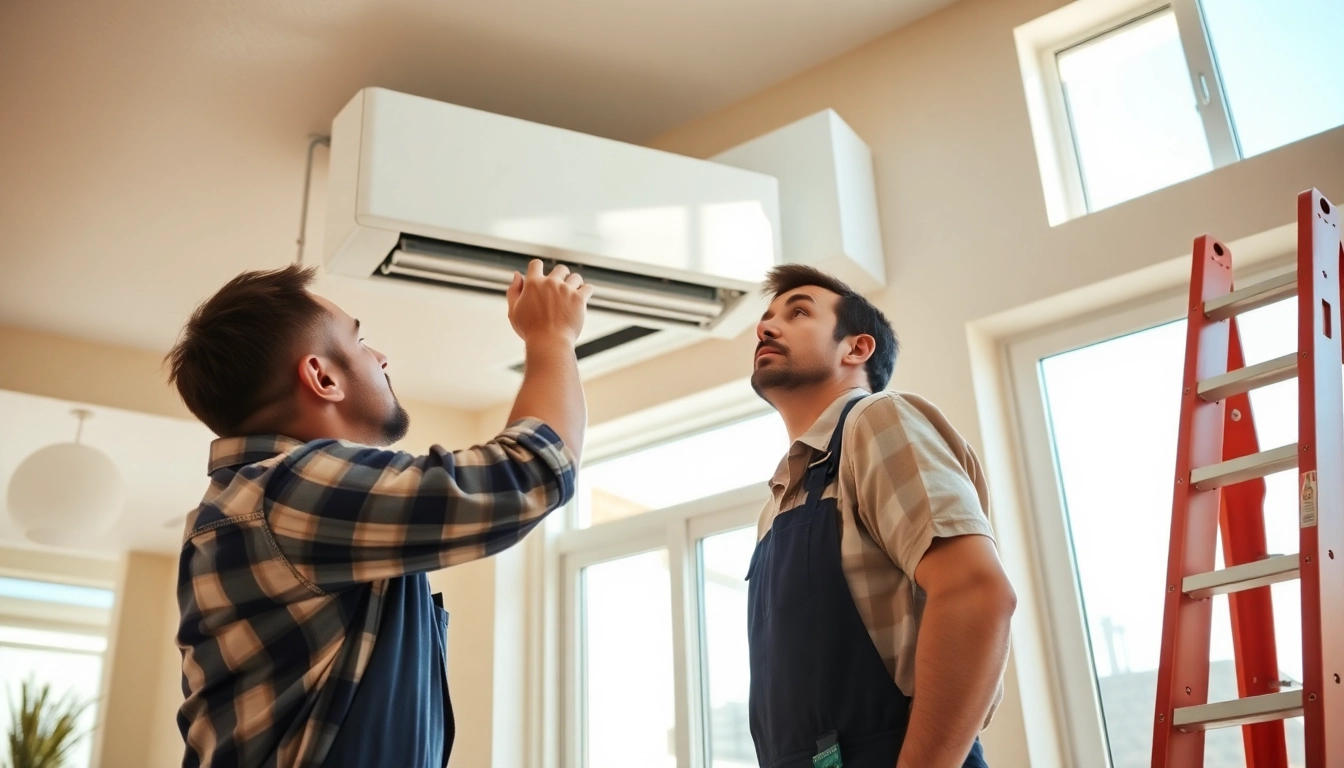Understanding Scottsdale AC Systems
Introduction to Air Conditioning in Scottsdale
Living in Scottsdale, Arizona, means enjoying the beautiful desert landscape and warm climate. However, this also means relying heavily on efficient air conditioning systems to combat the high temperatures, particularly during the summer. Among the many options for cooling, scottsdale ac systems are essential for ensuring comfort in both residential and commercial spaces. As the demand for air conditioning rises, it’s crucial to understand the different systems available and the factors that influence their performance in Scottsdale’s unique climate.
Types of AC Systems Available
Choosing the right air conditioning system involves understanding the various types available:
- Central Air Conditioning: Ideal for larger homes and buildings, central AC systems distribute cool air through a network of ducts, allowing for even temperature control throughout the entire space.
- Window Units: These compact, self-contained units are suitable for cooling single rooms and are often more affordable and easier to install than central systems.
- Split Systems: Comprising an indoor and outdoor unit, split systems offer flexibility and efficiency, making them popular in many Scottsdale homes.
- Ductless Mini-Split AC: Ideal for homes without ductwork, mini-split systems provide customizable room-by-room cooling and are often more energy-efficient.
- Heat Pumps: Serving as both heating and cooling systems, heat pumps are especially effective in moderate climates and can help lower energy bills.
How Climate Affects AC Choices in Scottsdale
The climate in Scottsdale, characterized by its hot desert conditions, significantly influences the choice of air conditioning systems. High summer temperatures, often exceeding 100°F, necessitate a robust air conditioning solution. It’s crucial to consider factors such as energy efficiency ratings, the size of the unit, and specific cooling needs based on the square footage and insulation of the building. Moreover, local climate trends, including humidity levels and peak temperature times, should also inform your system selection to ensure optimal performance and low operating costs.
Key Factors to Consider When Selecting Scottsdale AC
Size and Efficiency Ratings
Choosing the right size air conditioning unit is vital. An oversized unit may cool the space too quickly, failing to dehumidify the air effectively, while an undersized unit will struggle to maintain a comfortable temperature. Efficiency ratings, often indicated by the Seasonal Energy Efficiency Ratio (SEER), are critical to evaluating the energy consumption of an AC unit. Higher SEER ratings indicate more energy efficiency, translating into long-term savings on energy bills.
Installation Costs vs. Long-Term Savings
When selecting an air conditioning system, initial installation costs are a significant consideration. However, homeowners should also assess potential long-term savings. Energy-efficient units may have a higher upfront cost but can result in significant savings on monthly utility bills over time. Additionally, considering installation and maintenance costs is crucial in evaluating the total cost of ownership.
Energy Efficiency Standards and Rebates
Energy efficiency standards set by government bodies and utilities can provide financial incentives for homeowners. Participating in rebate programs for energy-efficient installations can lower initial costs significantly, making advanced technologies more accessible. Understanding these programs and determining eligibility can aid in selecting the right scottsdale ac system while maximizing value and efficiency.
Maintenance Tips for Your Scottsdale AC
Regular Tune-Ups and Inspections
Regular maintenance is essential for the longevity and efficiency of your air conditioning system. Scheduling periodic tune-ups and inspections helps identify potential issues before they become major problems. These services typically include cleaning the coils, checking refrigerant levels, and ensuring all components operate correctly. Additionally, a well-maintained system not only performs better but can also enhance indoor air quality.
Common Issues and How to Prevent Them
Common air conditioning issues include refrigerant leaks, electrical failures, and drainage problems. Regular maintenance can help prevent these issues, but homeowners should also be aware of potential trouble signs, such as unusual noises, weak airflow, or inconsistent temperatures. Understanding these indicators allows for timely intervention and repairs, potentially saving significant costs on major repairs.
DIY Maintenance Steps for Homeowners
Homeowners can incorporate several do-it-yourself maintenance tasks to keep their air conditioning units running smoothly:
- Filter Changes: Regularly replacing or cleaning air filters is one of the simplest but most effective maintenance tasks to ensure clean airflow and reduce strain on the AC system.
- Clearing Debris: Keeping the outdoor unit free from leaves, dirt, and other debris allows for effective heat exchange and optimizes efficiency.
- Thermostat Settings: Adjusting your thermostat settings when you are not home can reduce energy consumption and prolong the lifespan of the unit.
Choosing the Right HVAC Professionals in Scottsdale
What to Look for in an HVAC Contractor
Selecting a qualified HVAC professional is crucial for efficient and safe air conditioning installation and maintenance. Homeowners should look for contractors with proper licensing, certification, and insurance. Experience and positive industry reputation are essential factors; reading online reviews and obtaining referrals can help ensure you choose a reputable service provider.
Questions to Ask Before Hiring
When interviewing potential HVAC contractors, asking the right questions can provide insight into their qualifications:
- What types of air conditioning systems do you recommend for my home, and why?
- Can you provide references or examples of similar projects you have completed?
- What warranties or service guarantees do you offer on installations and repairs?
- How do you handle unexpected issues during the installation process?
Evaluating Reviews and Testimonials
Reviews and testimonials play a significant role in assessing the quality of HVAC service providers. Homeowners should look for patterns in feedback across various platforms and verify that the contractor has a history of timely and professional service. Additionally, checking with local Better Business Bureau ratings can help gauge the contractor’s reliability and service record.
Signs You Need an AC Upgrade in Scottsdale
Indicators of Inefficiency
Several signs indicate that your air conditioning system may need an upgrade. If you notice a significant increase in energy bills, inconsistent cooling, or frequent breakdowns, these may point to inefficiency. Furthermore, if your system struggles to maintain your desired temperature during peak heat, it could be time to reassess your equipment.
Age and Performance Considerations
The age of your air conditioning system is a critical factor in determining whether to upgrade. Most units have a lifespan of 10 to 15 years, and as they age, their efficiency decreases. If your system is approaching this age range and showing signs of reduced performance, investing in a new unit can lead to improved comfort and reduced energy costs.
Benefits of Upgrading Your AC System
Upgrading to a modern air conditioning system offers numerous benefits. New models typically feature advanced energy efficiency technologies, which can substantially lower energy costs. Additionally, with improved cooling performance and quieter operation, newer systems can enhance overall comfort. Many modern units also incorporate smart technology, allowing users to optimize temperatures remotely.



